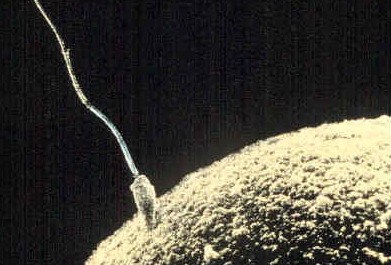Choosy Eggs May Pick Sperm for Their Genes, Defying Mendel’s Law
By Carrie Arnold,
Quanta Magazine
| 11. 15. 2017
In the winner-takes-all game of fertilization, millions of sperm race toward the egg that’s waiting at the finish line. Plenty of sperm don’t even make it off the starting line, thanks to missing or deformed tails and other defects. Still others lack the energy to finish the long journey through the female reproductive tract, or they get snared in sticky fluid meant to impede all but the strongest swimmers. For the subset of a subset of spermatozoa that reach their trophy, the final winner would be determined by one last sprint to the end. The exact identity of the sperm was random, and the egg waited passively until the Michael Phelps of gametes finally arrived. Or so scientists have thought.
Joe Nadeau, principal scientist at the Pacific Northwest Research Institute, is challenging this dogma. Random fertilization should lead to specific ratios of gene combinations in offspring, but Nadeau has found two examples just from his own lab that indicate fertilization can be far from random: Certain pairings of gamete genes are much more likely than others. After ruling out obvious...
Related Articles
By Diaa Hadid and Shweta Desai, NPR | 01.29.2026
MUMBRA, India — The afternoon sun shines on the woman in a commuter-town café, highlighting her almond-shaped eyes and pale skin, a look often sought after by couples who need an egg to have a baby.
"I have good eggs,"...
By Roni Caryn Rabin, The New York Times | 01.22.2026
The National Institutes of Health said on Thursday it is ending support for all research that makes use of human fetal tissue, eliminating funding for projects both within and outside of the agency.
A ban instituted in June 2019 by...
By Mike McIntire, The New York Times | 01.24.2026
Genetic researchers were seeking children for an ambitious, federally funded project to track brain development — a study that they told families could yield invaluable discoveries about DNA’s impact on behavior and disease.
They also promised that the children’s sensitive...
By Phil Galewitz, NPR | 01.20.2026
Serenity Cole enjoyed Christmas last month relaxing with her family near her St. Louis home, making crafts and visiting friends.
It was a contrast to how Cole, 18, spent part of the 2024 holiday season. She was in the hospital...




